Eco-lodges, beacons of sustainable tourism, offer travelers an immersive and environmentally conscious experience. These unique accommodations prioritize the preservation of natural ecosystems while providing guests with an unforgettable connection to the wonders of nature.
Delving into the world of eco-lodges, we uncover their sustainable practices, explore their positive and negative environmental impacts, and delve into the captivating experiences they offer guests. Furthermore, we examine their economic benefits for local communities, their innovative design principles, and the importance of certification and standards.
Eco-Lodge Definition and Concept
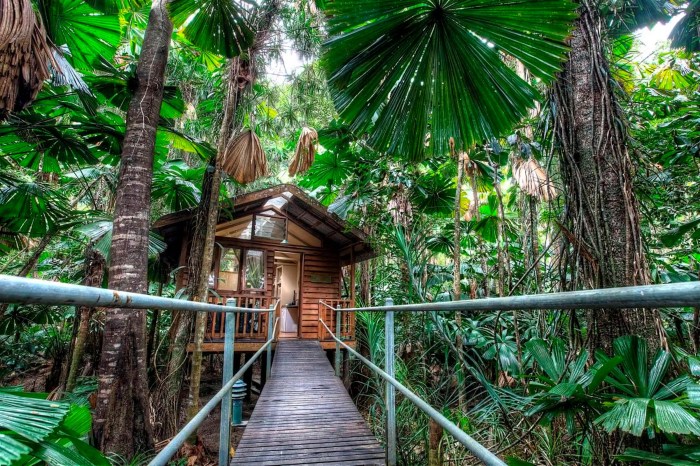
Eco-lodges are a type of sustainable accommodation that prioritizes environmental conservation and cultural preservation. They are designed to minimize their ecological impact while providing a comfortable and immersive experience for guests.
The purpose of eco-lodges is to promote responsible tourism that supports local communities and protects natural ecosystems. They often incorporate sustainable practices such as using renewable energy, conserving water, and minimizing waste. Eco-lodges also aim to educate guests about the importance of environmental conservation and cultural heritage.
Eco-lodges, blending sustainable practices with luxury, offer an immersive travel experience that caters to the discerning traveler. These secluded havens often grace the lists of top luxury travel destinations , attracting those seeking a unique blend of comfort, exclusivity, and environmental consciousness.
Eco-lodges prioritize responsible tourism, preserving the pristine ecosystems they inhabit while providing guests with an unforgettable journey that respects and celebrates nature’s beauty.
Goals of Eco-Lodges
- Minimize environmental impact through sustainable practices.
- Support local communities by creating jobs and promoting cultural exchange.
- Protect natural ecosystems by preserving biodiversity and habitat.
- Educate guests about environmental conservation and cultural heritage.
- Promote responsible tourism that benefits both the environment and local communities.
Sustainable Practices

Eco-lodges embrace sustainable practices to minimize their environmental impact and promote responsible tourism. These practices encompass various aspects of lodge operations, from energy conservation to waste management.
Implementing sustainable practices in eco-lodges contributes significantly to environmental conservation. It reduces carbon emissions, protects natural resources, and preserves biodiversity. Eco-friendly initiatives, such as using renewable energy sources, adopting water conservation measures, and minimizing waste, play a vital role in mitigating environmental degradation and ensuring the long-term sustainability of these destinations.
Energy Conservation
- Using solar panels, wind turbines, and hydropower systems to generate renewable energy.
- Installing energy-efficient appliances and lighting systems.
- Optimizing building design to maximize natural light and ventilation.
Water Conservation
- Implementing rainwater harvesting systems.
- Using low-flow fixtures and appliances.
- Educating guests on responsible water usage.
Waste Management
- Reducing, reusing, and recycling waste.
- Composting organic waste.
- Collaborating with local waste management companies.
Biodiversity Conservation
- Protecting and restoring natural habitats.
- Minimizing light pollution to reduce disturbance to wildlife.
- Educating guests on the importance of biodiversity.
Environmental Impact
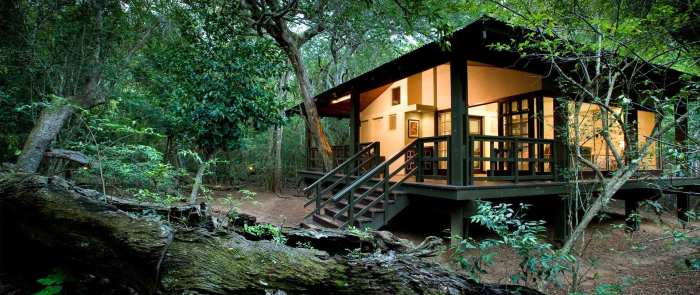
Eco-lodges strive to minimize their environmental footprint while promoting biodiversity conservation and sustainable practices. However, their impact on the environment is not entirely positive, and there are areas where sustainability can be further enhanced.
Positive Impacts
- Reduced carbon emissions: Eco-lodges often use renewable energy sources, such as solar or hydropower, to reduce their carbon footprint.
- Water conservation: Eco-lodges implement water-saving practices, such as rainwater harvesting and low-flow appliances, to conserve water resources.
- Waste reduction: Eco-lodges prioritize waste reduction through recycling, composting, and responsible waste disposal.
Negative Impacts
- Habitat fragmentation: The construction of eco-lodges can fragment natural habitats, potentially disrupting wildlife movement and ecological processes.
- Water pollution: Improper wastewater treatment or disposal can lead to water pollution, affecting aquatic ecosystems.
- Noise and light pollution: Eco-lodges can contribute to noise and light pollution, which can disrupt wildlife behavior and nocturnal species.
Biodiversity Conservation
Eco-lodges play a vital role in biodiversity conservation by:
- Protecting critical habitats: Eco-lodges are often located in ecologically sensitive areas, helping to preserve biodiversity and protect endangered species.
- Promoting sustainable tourism: Eco-lodges encourage responsible tourism, which minimizes environmental impact and supports local conservation efforts.
- Educating visitors: Eco-lodges provide educational programs and experiences that raise awareness about biodiversity conservation and sustainable practices.
Areas for Improvement
While eco-lodges are committed to sustainability, there are areas where they can improve their environmental performance:
- Energy efficiency: Eco-lodges can invest in more energy-efficient appliances, lighting, and building materials.
- Water management: Improved water management systems can reduce water consumption and prevent water pollution.
- Waste management: Eco-lodges can explore innovative waste management techniques, such as anaerobic digestion or composting, to further reduce waste.
Guest Experience
Eco-lodges provide unique and immersive experiences for guests, fostering a deep connection with the surrounding natural environment. They offer an escape from the hustle and bustle of urban life, allowing guests to reconnect with nature and appreciate its beauty.
Immersion in nature is a central aspect of the eco-lodge experience. Guests are encouraged to explore the surrounding ecosystems, participate in guided tours, and engage in activities that promote environmental awareness. Many eco-lodges offer educational programs and workshops that teach guests about local flora and fauna, conservation efforts, and sustainable practices.
Activities and Amenities, Eco-lodges
Eco-lodges offer a range of activities and amenities that enhance the guest experience and promote immersion in nature. These may include:
- Guided nature walks and hikes: Guided tours led by knowledgeable naturalists allow guests to explore the surrounding environment, learn about local ecosystems, and spot wildlife.
- Wildlife viewing: Eco-lodges often offer opportunities for guests to observe wildlife in their natural habitats. This may include birdwatching, whale watching, or game drives.
- Outdoor activities: Many eco-lodges offer outdoor activities such as kayaking, canoeing, snorkeling, and mountain biking, allowing guests to experience the natural surroundings from a different perspective.
- Cultural experiences: Some eco-lodges are located in areas with rich cultural traditions. Guests can participate in cultural activities, learn about local customs, and interact with the indigenous communities.
Economic Benefits: Eco-lodges
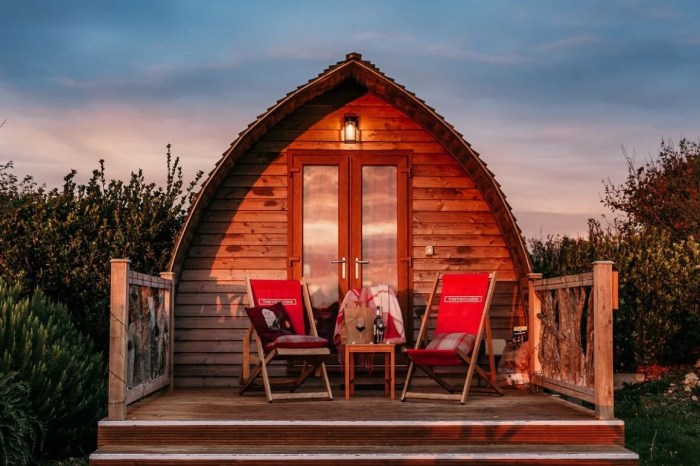
Eco-lodges play a vital role in driving economic growth and fostering sustainable tourism in local communities. They create job opportunities, support local businesses, and promote economic diversification.
Job Creation
Eco-lodges require a diverse workforce, including hospitality staff, guides, and maintenance personnel. These jobs provide a stable income source for local residents and contribute to the development of skilled labor.
Sustainable Tourism
Eco-lodges attract eco-conscious travelers who seek authentic and environmentally responsible experiences. By promoting sustainable tourism, eco-lodges encourage visitors to support local businesses and contribute to the preservation of natural and cultural heritage.
For a nature-immersive retreat, eco-lodges offer a sustainable and serene escape. While luxury beach resorts cater to those seeking indulgence, eco-lodges prioritize preserving the natural environment, providing a unique and immersive experience that connects guests with the beauty and tranquility of their surroundings.
Case Study: Costa Rica
Costa Rica, a renowned ecotourism destination, has experienced significant economic benefits from eco-lodges. According to the Costa Rican Tourism Board, the tourism industry contributes approximately 6% of the country’s GDP and employs over 600,000 people.
Design and Architecture
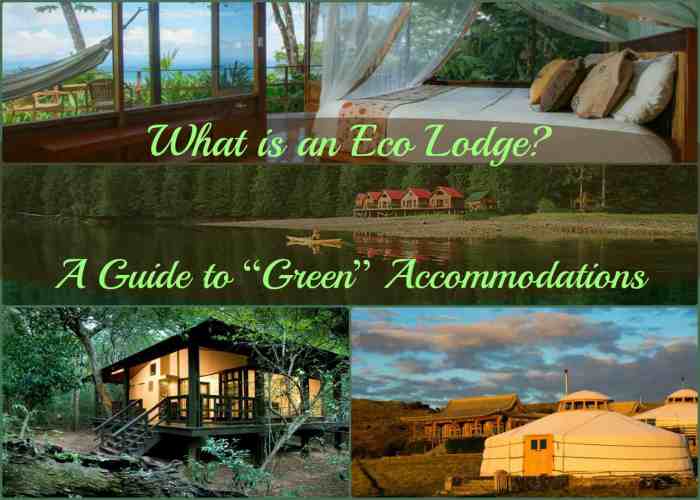
Eco-lodges prioritize sustainable design principles and architectural features to minimize environmental impact while maximizing harmony with the natural surroundings.
These lodges are designed to blend seamlessly into their natural settings, utilizing local materials, traditional building techniques, and renewable energy sources. Their architectural features often include:
Sustainable Building Techniques
- Using recycled and locally sourced materials to reduce carbon footprint and support local economies.
- Employing passive solar design to regulate indoor temperatures naturally, reducing energy consumption.
- Incorporating natural ventilation and lighting to minimize reliance on artificial systems.
- Utilizing rainwater harvesting systems to conserve water and reduce strain on local resources.
- Implementing waste management strategies to minimize environmental pollution and promote recycling.
Certification and Standards
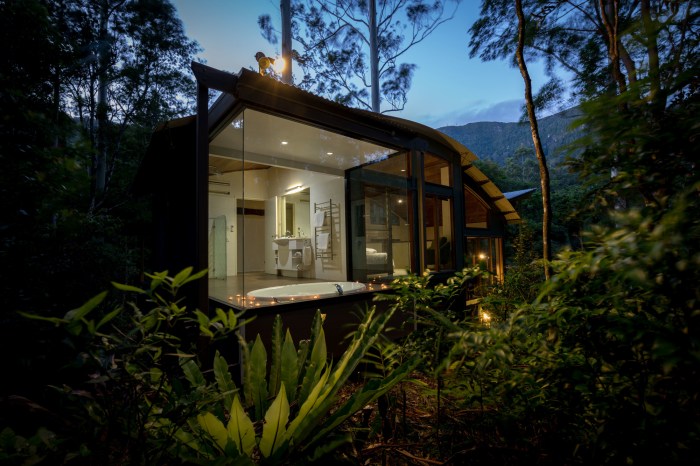
Eco-lodge certification programs play a pivotal role in ensuring sustainability and credibility within the industry. By adhering to strict standards, lodges can demonstrate their commitment to environmental protection and responsible tourism practices.
For a truly immersive and eco-conscious adventure, consider an eco-lodge stay. These accommodations blend seamlessly into their natural surroundings, offering a unique way to experience the great outdoors. Whether you’re seeking the adrenaline rush of extreme sports vacations or simply want to relax and unwind, eco-lodges provide a sanctuary where you can connect with nature and create lasting memories.
Reputable organizations like the Global Sustainable Tourism Council (GSTC) provide certification programs that assess lodges based on criteria such as energy efficiency, water conservation, waste management, and community engagement. These certifications provide assurance to guests that they are choosing lodges that prioritize sustainability and ethical practices.
Examples of Certification Programs
- Green Globe: A comprehensive certification program that evaluates lodges across 44 sustainability indicators.
- LEED (Leadership in Energy and Environmental Design): A green building certification program that focuses on energy efficiency, water conservation, and indoor environmental quality.
- Rainforest Alliance: A certification program that promotes sustainable farming and forestry practices in the tourism industry.
Challenges and Opportunities
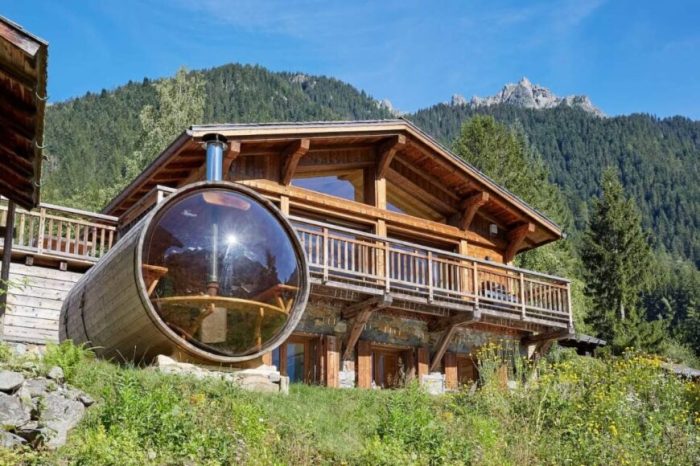
Eco-lodges face challenges in maintaining sustainability, but they also have opportunities for innovation and improvement. These challenges and opportunities can be categorized into three main areas: environmental, social, and economic.
Environmental challenges include the need to minimize the lodge’s impact on the surrounding environment. This can be achieved through the use of sustainable building materials, energy-efficient appliances, and water conservation measures. Social challenges include the need to provide a positive experience for guests while respecting the local culture and community. This can be achieved through the use of local staff, the provision of cultural activities, and the support of local businesses. Economic challenges include the need to generate enough revenue to cover the costs of operation and maintenance. This can be achieved through the use of innovative marketing strategies, the development of new revenue streams, and the formation of partnerships with other businesses.
Overcoming Challenges
Many eco-lodges have successfully overcome these challenges through innovative and creative solutions. For example, the Soneva Kiri Eco-Resort in Thailand uses solar panels to generate electricity and has a water filtration system that purifies rainwater for drinking. The Mashpi Lodge in Ecuador employs local staff and offers guided tours of the surrounding rainforest. The Explora Patagonia Lodge in Chile has partnered with a local conservation organization to protect the surrounding wilderness area.
Final Conclusion
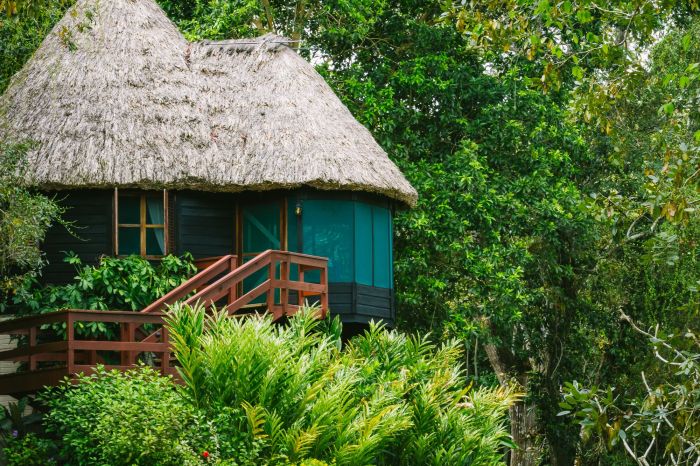
As we conclude our exploration of eco-lodges, it becomes evident that they play a crucial role in promoting environmental conservation, supporting sustainable tourism, and providing guests with an enriching and unforgettable connection to nature. Their commitment to sustainability sets a benchmark for the tourism industry, demonstrating that responsible travel and environmental stewardship can go hand in hand.
FAQ Resource
What are the key features of eco-lodges?
Eco-lodges prioritize sustainable practices, such as energy efficiency, water conservation, waste management, and the use of renewable resources. They aim to minimize their environmental footprint while offering guests a comfortable and immersive experience.
How do eco-lodges contribute to environmental conservation?
Eco-lodges play a crucial role in protecting biodiversity by preserving natural habitats and promoting responsible tourism practices. They educate guests about environmental issues and encourage sustainable behaviors, raising awareness and fostering a sense of stewardship.
What are some of the challenges faced by eco-lodges?
Eco-lodges face challenges in balancing sustainability with the need to provide a comfortable guest experience. They must also navigate issues such as waste management in remote locations, ensuring access to clean water, and adapting to changing environmental conditions.